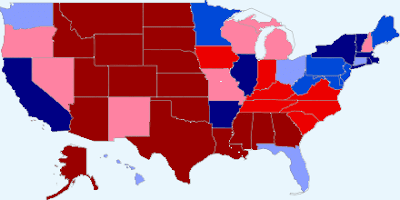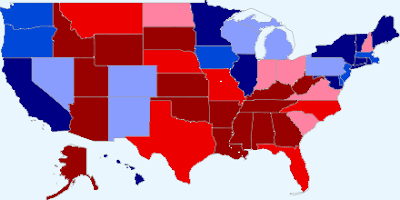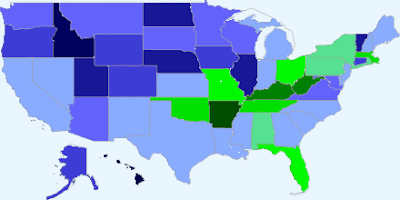The Florida and Michigan frontloading in 2008 is part of the progression of the general frontloading trend. It wasn't inevitable that either state would violate the "window rule" (period within which states could hold their nominating contests) of either party. In the post-reform era, states that wanted to move, moved to dates that fell within the window. The decision by the DNC to allow South Carolina and Nevada to move into the pre-window period, though, triggered a resumption of an age-old conflict in American history: small states vs. big states. So while the DNC's intent was to bring more diversity into the opening contests, they once again got some unintended consequences out of the changes (All you have to do is look at frontloading as an example of one of the DNC's post-reform, unintended consequences.).Key dates related to the Democratic National Committee's handling of the 2008 Michigan and Florida primaries:
2006:
July 22: The Democratic Party's Rules and Bylaws Committee recommends to the DNC that a Nevada caucus be held in 2008 between Iowa's Jan. 14 caucus and New Hampshire's Jan. 22 primary. The committee also suggests that South Carolina have an early primary after New Hampshire's and that other states cannot hold their contests before Feb. 5.Aug. 19: The DNC approves the committee's recommendations and penalties against presidential candidates who campaign in states that cut in line. Candidates would be denied delegates from those contests.
2007:
Jan. 23: Florida lawmakers introduce legislation to move the date of the state's 2008 primary from March 4 to Jan. 29.
April 5: The two leaders of the rules committee notify the Florida congressional delegation about the penalties for states that violate the timing of primaries.
May 21: Florida Gov. Charlie Crist signs a bill moving the state's presidential primary to Jan. 29, 2008.
July-early August: In discussions with the Florida Democratic officials, the DNC offers to pay about $880,000 for a state party-run caucus.
Aug. 25: The rules committee decides to strip Florida of its 210 presidential convention delegates. It gives the state party 30 days to comply with rules by moving its contest back at least seven days.
Aug. 30: The Michigan Legislature sends a bill to the governor setting the state's 2008 presidential primary for Jan. 15.
Aug. 31: Democratic presidential candidates Bill Richardson, Chris Dodd and Joe Biden pledge not to campaign in states that hold early nominating contests in violation of party rules. The pledge is circulated by Democratic leaders of the early-voting states — Iowa, Nevada, New Hampshire and South Carolina.
Sept. 1: Hillary Rodham Clinton, Barack Obama and John Edwards also sign on to a pledge to skip states that break party rules by holding early primaries.
Sept. 4: Michigan Gov. Jennifer Granholm signs a bill moving Michigan's presidential contests to Jan. 15, 2008.
Oct. 9: Democratic presidential candidates Obama, John Edwards and Bill Richardson file paperwork to withdraw from the Michigan ballot. Joe Biden and Dennis Kucinich say in statements that they also were bypassing the primary. Chris Dodd and Clinton say their names will remain on the ballots.
Dec. 1: Democratic leaders strip Michigan of all its 156 delegates for scheduling an earlier-than-allowed primary.
2008:
Jan. 15: Michigan holds its primary; Clinton wins.
Jan. 29: Florida holds its primary; Clinton wins.
March 17: Facing strong opposition, Florida Democrats abandon plans to hold a do-over presidential primary with a mail-in vote.
April 4: The executive committee of the Michigan Democratic Party says "it is not practical" to conduct a party-run primary or caucus as a way to get the state's delegates seated at the Denver convention.
April 25: The leaders of the rules committee sends members a memo announcing a meeting on May 31 about the disputed Florida and Michigan primaries.
May 27: The Democratic Party's lawyers say the committee has the authority to seat some delegates from Michigan and Florida but not fully restore the two states as Clinton wants.
___
Source: Associated Press, Democratic National Committee.
Why South Carolina and Nevada and not Michigan and Florida? Of the ten states (Alabama, Arizona, Arkansas, Colorado, Hawaii, Michigan, Mississippi, Nevada, South Carolina and West Virginia) that petitioned the DNC to move ahead of the window's starting point, Michigan was by far the largest (Measuring by electoral votes, Michigan was the only state with more than 10.). Yet, the DNC opted for two smaller states to fill those spots. And that decision, along with Florida and Michigan's defiance of these rules, underscores another of the problems facing the various reform plans that have been proposed. Big states still will not be allowed to go first. And that is why today's meeting is so important. If the sanctions for moving ahead of the window are not upheld, what will hold states back from moving to whatever date they choose in the future (whether reforms are enacted or not)? Michigan certainly wouldn't have gone on January 15 if any of the reform plans (save the one in four chance that Michigan's region in the NASS regional primary plan was chosen to go first) were in place in 2008. The same motivation, therefore, would have been there for lawmakers in Michigan even in a reformed system.
Will the sanctions stay or will they go? The educated guess is that half the delegates from Florida and Michigan will make it to the convention in Denver, but how will that half be determined and what effect would that have on the delegate counts for Clinton and Obama?
Recent Posts:
Will Kennedy's Diagnosis Hurt McCain?
The Electoral College Maps (5/28/08)
Test Run: The McCain-Obama Map (5/28/08)







